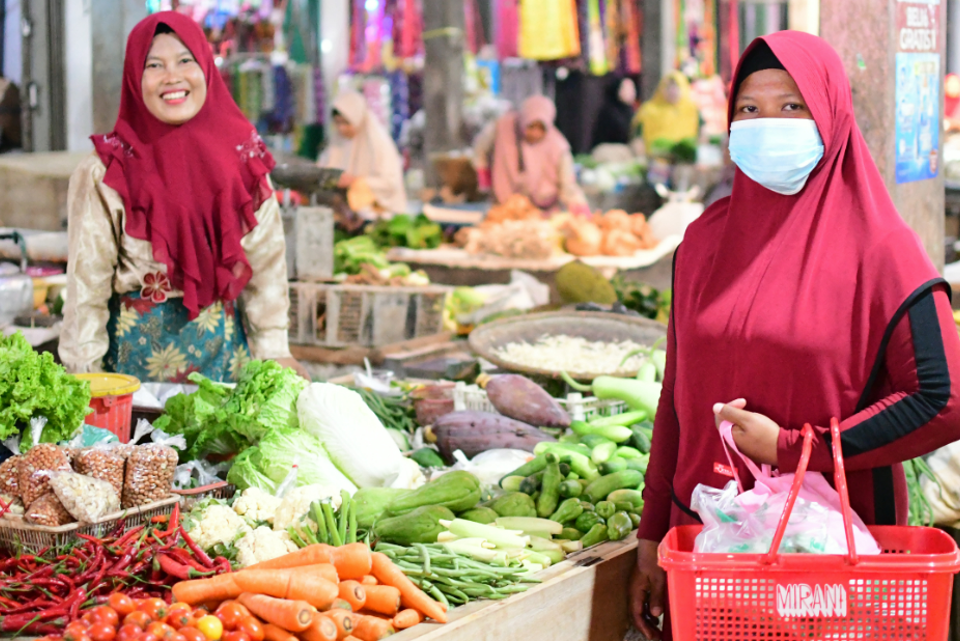
Caritas Australia staff handing over hygiene kits to the PNG Catholic Health Services officer for distribution to health staff. Credit_Robin Lesley, CA Protection Coordinator.
On March 17, Prime Minister Scott Morrison announced that Australia will ramp up support to Papua New Guinea, and allocate 8000 vaccines, as well as personal protective equipment and medical specialists to support the country in response to an alarming mass outbreak of COVID-19.
The Australian Government has also ordered one million doses of the Astra Zeneca vaccine for Papua New Guinea out of Australia’s contracted supplies.
Despite the unfolding crisis, testing rates are extremely low, as only a limited number of facilities are able to conduct regular screening and testing, which puts even more pressure on an already stretched healthcare system.
“One of the challenges for Papua New Guinea is the cost of testing and treatment,” says Diane Unagi, Caritas Australia Country Representative for Papua New Guinea.
“Health facilities across Papua New Guinea have struggled with a lack of medical supplies over the past year as they respond to COVID-19, so supplies of personal protective equipment will make an immediate difference where it matters,” says Diane.
“The public hospitals are already overwhelmed and there are major delays in being tested and receiving results. A COVID-19 test in a private clinic, which most people prefer, can cost up to AUD $300, and even then they are often not available.”
The support from the Australian Government will make a significant difference to one of our closest neighbours, and our staff in Australia and overseas welcome the news.
“The Australian Government has really stepped up to provide support where and when it matters most,” says Kirsty Robertson, CEO of Caritas Australia. “We have been working with local communities and church partners in PNG for over 50 years, and know from experience that local people are best placed to respond to crises, because they understand the context and challenges.”
“Roughly half of the schools and health facilities in Papua New Guinea are run by churches, which means that working through existing church networks is one of the most efficient ways to counter misinformation and build trust.”
“Church networks are able to reach deep into communities, including the most marginalised – such as those living with disabilities, women experiencing gender-based violence, and communities in remote and extremely rural locations.”

Encouraging handwashing, although some schools don't have access to water. Photo: Caritas Australia/Caritas PNG
Caritas Australia is supporting church and NGO partners on the ground, prioritising preventative health measures, including community education.
We’ve worked with local partners, including Caritas Papua New Guinea and Catholic Church Health Services, to respond to the most urgent needs in the country.
- Over 304,000 items of Personal Protective Equipment (including masks, gloves and gowns) have been distributed to 19 provinces, reaching a total of 235 health facilities.
- Over 200 teachers and health workers from six provinces received training in COVID-19 awareness, ensuring approximately 15,000 students and community members received vital preventative health information.
- Seven radio jingles were developed for PNG Radio Maria and Diocesan Radio stations, and 18,300 educational posters and fact-sheets were distributed, reaching 3,000 schools.
- One thousand hygiene kits were distributed to vulnerable children, including those in orphanages, settlements and the West Papua refugee camp.
“In Papua New Guinea a lot of our work is done through the Church Partnership Program, which has been running since 2004, and is the longest funded program by the Department of Foreign Affairs and Trade (DFAT),” says Emma Dawson, Pacific Program Manager at Caritas Australia.
“This means that we’ve been able to develop remarkable partnership and collaboration amongst the seven main churches in Papua New Guinea, of which the Catholic Church is one. This has been invaluable in combatting misinformation and a lack of awareness about COVID-19 in the community.”
To support Caritas Australia and partners in Papua New Guinea, please donate to our COVID-19 appeal.

















